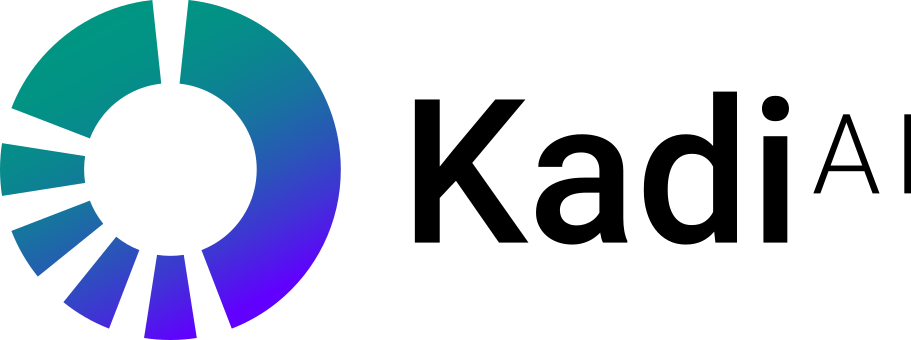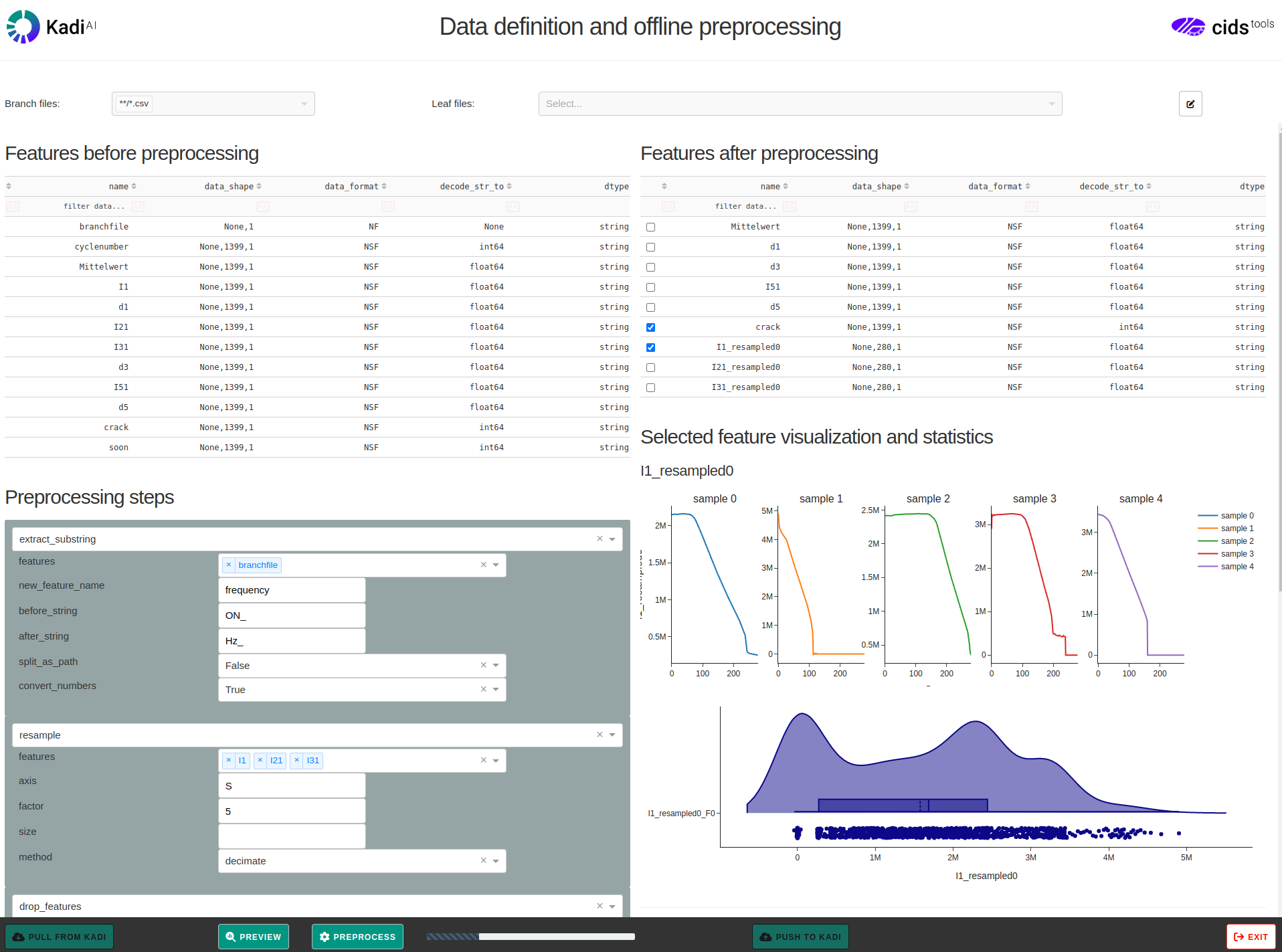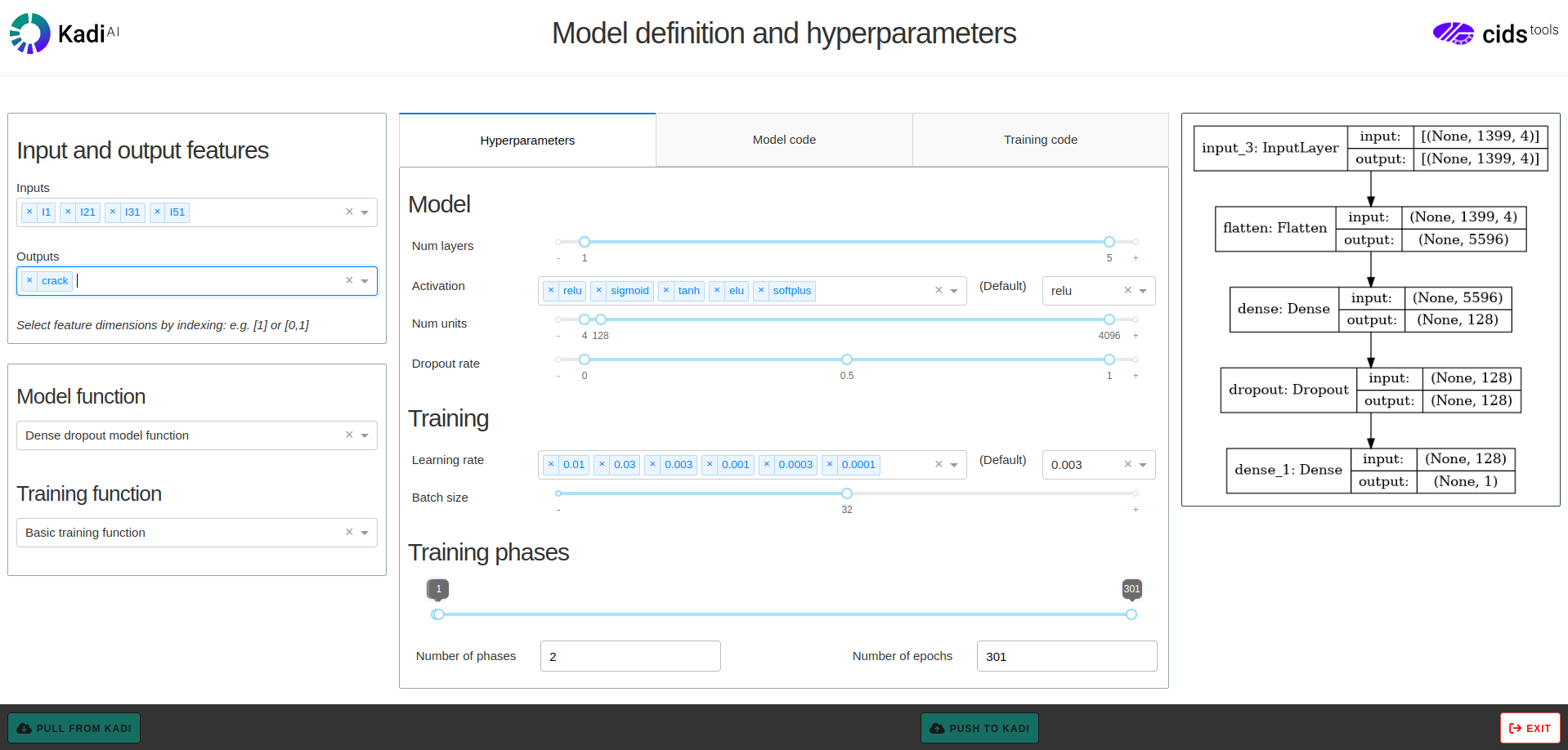
KadiAI and CIDS are Kadi4Mats's interface and solution for integrated Machine Learning (ML) and Artificial Intelligence (AI).
Overview
The main challenge of AI for interdisciplinary research is to work with high-dimensional data with vastly diverse characteristics, such as dimensionality, ranges and physical meaning. In physical sciences, data are often represented in the spatiotemporal (4d numerical tensors) or frequency domains. Those multidimensional data may be processed and transformed, originate from different experimental and numerical sources and exist in different quantities and qualities. Combining and exctracting such diverse features in the data poses a challenge that is often missing in classical showcase applications for ML algorithms, which focus on only spatial (2d images) or temporal (1d speech) data.

Moreover, scientific applications often combine analysis, synthesis and exploration steps, and they seek to extract and transfer knowledge from one such step to another. Translated into ML terms, this means that we want to reuse and combine parts of a model that was developed for analysis to evaluate an exploration step, or synthesize a new or improved version of the investigated object. Therefore, KadiAI and CIDS support the structured storage and reuse of partial models, thereby enabling characterization and descriptive analyses (many-to-few mappings), generation and information synthesis (few-to-many mappings), and explorative design and discovery tasks (many-to-many mappings).
Using KadiAI and CIDS offers the following advantages and features:
- Automatize AI model training, hyperparameter search, evaluation, analysis, explanation and visualization
- Unified interface to different ML libraries (Tensorflow, Scikit-learn, ...)
- Standardized and efficient data pipelines and predefined models
- Automatically combine and define multidimensional data from diverse sources
- Interactive dashboards to develop, monitor and visualize your ML applications
- Supports Python, Jupyter, Kadi4Mat Workflows and command line execution
- Flexible and persistent model definition through model-building functions
- Data provenance tracking and AI ontology in Kadi4Mat
Solutions


FAQ
Yes, you can fully customize your model-building functions and offline or online pre- and postprocessing functions in CIDS. You can select one of the provided models, copy and modify existing models, or write your own model from scratch within the CIDS framework. In addition, you can mix and match models from different ML libraries, such as Scikit-learn or Tensorflow.
The advantage of CIDS lies in being able to save a meta model, as well as model-building functions and restore the meta model without loosing functionality. In many ML libraries, each model is fixed after saving and no meta model that can build more models is stored, which looses functionality for hyperparameter tuning, model searches and transfer learning. Thus, CIDS saves the meta model, including model-building function and data pipelines, as well as weights and connectivity of specific trained models.
CIDS does not seek to replace existing libraries, but provides a framework to define models using these ML libraries. Thus, CIDS complements existing libraries to provide a common interface and standardized workflows. Thereby, CIDS aims to reduce redundant, boiler-plate code and to provide efficient implementations of data pipelines and models.
Yes, both CIDS and KadiAI are highly modular, so you can use both components independently.
For example, you can use only KadiAI's projects to upload, download, record and track ML data that you generated using your own scripts without using CIDS. Perhaps, even if you easily develop your own AI models and prefer not to use CIDS' distributed learning solution, you are still interested in using CIDS' data pipelines to describe your data conventiently and combine multidimensional features for your models. Alternatively, you can focus on implementing your custom models in CIDS or use CIDS' standardized models to compare your custom models with your own results.
Likewise, CIDS also runs without Kadi4Mat, perhaps, if you want to rapidly work on your data and models without synchronizing your intermediate results. Alternatively, you may want to keep your results and approach private until you have published an accompanying preprint or publication, or you are already using a different repository to share your research.
Nevertheless, both KadiAI and CIDS complement each other to help your ML research: they save your progress, relieve you of tedious tasks that 'reinvent the wheel' and support you with efficient, generic and flexible solutions.
Yes, all CIDS and KadiAI functionality can be accessed from various environments. Beside the AI project and model functionality implemented in Python and accessible in Python scripts and Jupyter notebooks, we offer interactive dashboards for visualization, development and monitoring of your ML workflow. These dashboards can be accessed from Jupyter, from interative Kadi4Mat workflow nodes, from the command line and from within Python.
Not yet, but possibly in the future. We offer a straightforward installation procedure through pip and docker for quick deployment. Since ML is numerically expensive, providing hosted services, as we do for Kadi4Mat, is a considerable effort. Additionally, providing hosted services often leads to resulting software to rely on the hosted architecture, thus limiting open source contributions to the codebase. However, we will revisit this request, once we have found solutions to both problems.
Applications
KadiAI and CIDS are developed for AI applications in interdisciplinary research. Due to its vast scientific scope, interdisciplinary approaches and diverse data, materials science motivates many of our applications towards which CIDS and KadiAI facilitate generic solutions. Thus, both software packages enable practical solutions to arbitrary research problems.
About
How to cite:
Koeppe, A., 2021. Deep Learning in the Finite Element Method (No. RWTH-2021-04990).
RWTH Aachen University, Aachen.
DOI: 10.18154/RWTH-2021-04990
KadiAI and CIDS are developed actively at the Karlsruhe Institute of Technology (KIT) as part of several research projects, including:
- FoAIm, supported by the Helmholtz Artificial Intelligence Cooperation Unit (Helmholtz-AI) and funded by the Initiative and Networking Fund (IVF) of the Helmholtz Association under grant number ZT-I-PF-5-075.
- FestBatt, the Cluster of Competence for Solid-state Batteries, funded by the German Federal Ministry of Education and Research (BMBF) under grant number 03XP0435D.
- POLiS, the Post Lithium Storage Cluster of Excellence, funded by the German Research Foundation (DFG) under project number 390874152.
- MoMaF, the Science Data Center for Molecular Materials Research, funded by the Ministry of Science, Research and the Arts Baden-Württemberg (MWK-BW) under grant number 34-7547.222.
- NFDI4Ing, the National Research Data Infrastructure for Engineering Sciences, funded by the German Research Foundation (DFG) under project number 442146713.
Institute of Nanotechnology (INT)
Arnd Koeppe
KadiAI at the IAM/INT
Feedback/support requests may also be sent tokadi.ailists.kit.edu

